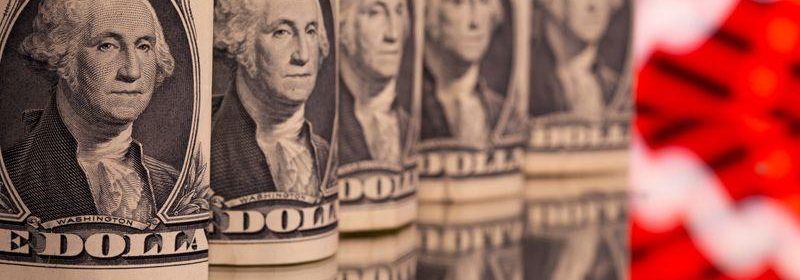Dollar steadies on U.S. recovery hopes, Bitcoin near record $52,640

LONDON (Reuters) – The dollar traded shy of recent highs on Thursday after its first back-to-back gains in two weeks as upbeat data bolstered expectations that the U.S. economy would recover from the coronavirus pandemic faster than that of most of its peers.
Bitcoin traded close to the record high of $52,640 reached overnight, with its roughly 58% surge this month prompting some analysts to warn that the rally might be unsustainable.
Government stimulus cheques helped U.S. retail sales rebound in January, while industrial output and producer prices data also provided upside surprises.
Investors expect a further boost from President Joe Biden’s proposed $1.9 trillion COVID-19 relief package, with the president meeting top labour leaders on Wednesday to drum up support for the plan.
Meanwhile, minutes from the Federal Reserve’s policy meeting last month reinforced the central bank’s willingness to let the economy run hot while keeping monetary settings ultra-accommodative.
“As we have seen over recent weeks, the dollar has become increasingly cyclical as there is now a link to the pricing of Fed and expected tapering and probably too, that with volatility indices generally low we also have more room to focus on smaller relative differences and cross-asset correlations have come down,” said Mikael Milhøj, senior analyst at Danske Bank.
“Either way, retail sales was a good event study to underpin our view of U.S. outperformance in H2 can support dollar. This is unlike last year, where positive surprises would always be dollar-negative, no matter the origin as it removed deflation risks.”
The dollar index was off 0.2% at 90.675 on Thursday in morning trade in London after strengthening 0.2% overnight and 0.4% on Tuesday.
The gauge has gained about 1% this year, rebounding from an almost 7% slide in 2020 that extended to a two-and-a-half-year low of 89.206 in early January.
“Market conviction in the weaker dollar has wavered as US yields have risen, with net short positions coming off in recent weeks. But we don’t think the rise in yields will prevent a longer-term decline in the U.S. currency,” said strategists at UBS Global Wealth Management in a note to clients.
“The dollar remains the most expensive currency we track within the G10, and mounting twin deficits amid generous fiscal spending will reduce its appeal. We think the reflation trade will likely send commodity-linked currencies higher, thanks both to increased demand and also on risk sentiment, with our favoured currencies forecast to average mid-single digit appreciation by year-end.”
The euro gained 0.2% to $1.2065 after sliding 0.5% overnight, the most in two weeks.
The dollar was almost flat at 105.735 yen, following a pullback Wednesday after reaching a five-month high of 106.225.
Sterling traded above $1.39 against the dollar and hit a high against the euro of 86.70 pence. The pound is the best-performing G10 currency against the dollar this year.
(The dollar traded shy of recent highs on Thursday after its first back-to-back gains in two weeks as upbeat data bolstered expectations that the U.S. economy would recover from the coronavirus pandemic faster than that of most of its peers.
Bitcoin traded close to the record high of $52,640 reached overnight, with its roughly 58% surge this month prompting some analysts to warn that the rally might be unsustainable.
Government stimulus cheques helped U.S. retail sales rebound in January, while industrial output and producer prices data also provided upside surprises.
Investors expect a further boost from President Joe Biden’s proposed $1.9 trillion COVID-19 relief package, with the president meeting top labour leaders on Wednesday to drum up support for the plan.
Meanwhile, minutes from the Federal Reserve’s policy meeting last month reinforced the central bank’s willingness to let the economy run hot while keeping monetary settings ultra-accommodative.
“As we have seen over recent weeks, the dollar has become increasingly cyclical as there is now a link to the pricing of Fed and expected tapering and probably too, that with volatility indices generally low we also have more room to focus on smaller relative differences and cross-asset correlations have come down,” said Mikael Milhøj, senior analyst at Danske Bank.
“Either way, retail sales was a good event study to underpin our view of U.S. outperformance in H2 can support dollar. This is unlike last year, where positive surprises would always be dollar-negative, no matter the origin as it removed deflation risks.”
The dollar index was off 0.2% at 90.675 on Thursday in morning trade in London after strengthening 0.2% overnight and 0.4% on Tuesday.
The gauge has gained about 1% this year, rebounding from an almost 7% slide in 2020 that extended to a two-and-a-half-year low of 89.206 in early January.
“Market conviction in the weaker dollar has wavered as US yields have risen, with net short positions coming off in recent weeks. But we don’t think the rise in yields will prevent a longer-term decline in the U.S. currency,” said strategists at UBS Global Wealth Management in a note to clients.
“The dollar remains the most expensive currency we track within the G10, and mounting twin deficits amid generous fiscal spending will reduce its appeal. We think the reflation trade will likely send commodity-linked currencies higher, thanks both to increased demand and also on risk sentiment, with our favoured currencies forecast to average mid-single digit appreciation by year-end.”
The euro gained 0.2% to $1.2065 after sliding 0.5% overnight, the most in two weeks.
The dollar was almost flat at 105.735 yen, following a pullback Wednesday after reaching a five-month high of 106.225.
Sterling traded above $1.39 against the dollar and hit a high against the euro of 86.70 pence. The pound is the best-performing G10 currency against the dollar this year.
(Graphic: Reflation trade’s big FX winner: GBP – )
Source: Read Full Article
